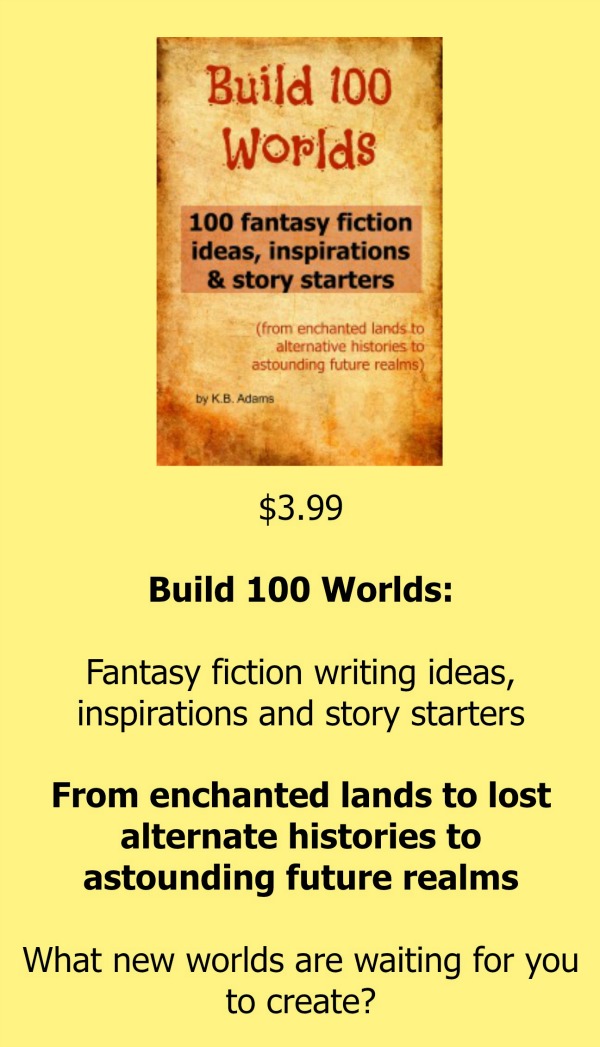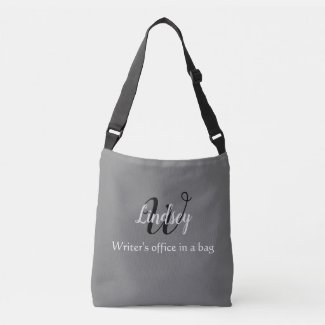Real life experiential fantasy novel research on a budget
Copyright National Lilac Publishing, LLC
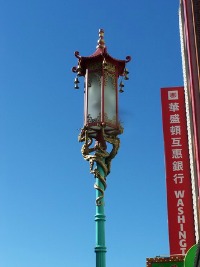
We
occasionally hear arguments that true authors must experience their
research in real life if they haven't already lived it. They can’t just
read about China, they must go and live there for a time. They can’t
simply watch videos of small craft piloting, they must take lessons and
become an expert. And if the experience or location is purely
imagination? Then they at least must make-shift something similar and
live it for a time.
And though impossible for most of us, who doesn’t want to travel to exotic places and immerse in local cultures? Wouldn’t we love to book a three month vacation inside a future weightless dome community. How about actually spending a season as a medieval shepherd, guiding a flock into high mountain meadows for summer until it’s time to return to the valley’s freshly hay-stocked barns in autumn.
A rare number of fantasy fiction authors do live this kind of life. Their financial and
time budgets allow it and it certainly expands the quality of their
work.
But
successful fantasy fiction and sci-fi has also come from authors who
mainly read and video-watch their research instead. Their financial
budget and time budget don't allow such long excursions.
Luckily there is a research middle ground for fantasy fiction writers on time and financial budgets who want to incorporate detail and richness into their stories that comes from actually experiencing the research. And it can lead to such career success that these writers eventually can expand their real life experiential research to more world travel and the like.
Jean M. Auel, author of the award winning and bestselling Clan of the Cave Bear and its sequals, researched
much of her first novel with library research. But she also did some
middle ground research that fit into her time and money budget. She took
a survival class to experience constructing an ice cave, and learned
how to knap stone, tan leather, and start fire in primitive ways from an
aboriginal skills expert. Then, once her first novel became a success,
she was actually able to travel across Europe from France to the
Ukraine, experiencing old Europe locations first hand, and going
directly to sites of prehistoric ruins and relics. She was able to meet
many more well-known but hard-to-meet experts in person and attend more
seminars and conferences.
For now, you can start out with middle ground research, also.
Perhaps
writers can’t spend thousands of dollars on reservations with Zero Gravity Corporation to
experience flight and weightlessness. Or they can’t take horseback
riding lessons and experience horseback journeys across the plains. Nor
can they travel to Chinese neighborhoods or South American jungles. But
that doesn’t mean a touch of actually experiencing weightlessness, live
horses, Chinese culture and humid tropical trails can’t be part of their
research, with resulting details woven into their fantasy fiction or
sci-fi stories.
Below is a list of lower time and money budget possibilities that can add rich detail to your fantasy fiction stories. Remember you are live-researching for the type of details you can weave into fantasy -- some flavors and aromas, touch sensations, certain sounds, people’s mannerisms which you can apply to a character or two… you’re not researching for facts to fill real world geography and sociology textbooks. So if a non-Asian writer can't live in China for research, but visits a nearby Chinatown in his closest city, he doesn’t need to render the accurate details of the current Chinese government and overview of all commoners’ lifestyles and variety of appearances. Instead, a writer can notice details of a few particular Chinese people for just one or two characters -- inflections in the Chinese voices, body type descriptions, how couples appear to treat each other, details of their ethnic traits, perhaps the texture, aroma and taste of a traditional meal and a bit of architectural detail, and so on. Your own discernment will help you separate authentic, useful details from shallow ones made visible just for the sake of tourists.
__________
Writer's office in a bag! Your own name and monogram:
Same with writers of other countries, such as those of Asian descent who can’t travel to America or Europe but want some real life details for a Caucasian character or American lifestyle. If they can find “little Europes” meant for tourists of their country, or American expat neighborhoods with restaurants and foodie clubs or other gathering places that welcome newcomers, they can at least experience a meal there, and take notes on body language, the appearance of head and facial hair, and so on which will allow them to describe one or more European descended characters in richer and original detail.
The list below could go on indefinitely -- but by reading a few samples of middle ground experiential research, writers may ignite the part of their brains that see these opportunities everywhere around them. Their “reading and video only” research can now have an added real life experienced third dimension.

Experience weightlessness, zero gravity, adrenal rush apprehension, freefalling and more at Six Flags. There are Six Flags amusement parks throughout Canada, USA and Mexico, and no doubt similar permanent mega-amusement parks throughout the world implementing various newly designed rides meant to provide weightless, flight and more other-worldly sensations. The Six Flags Drop of Doom allows you to briefly experience freefalling and weightlessness. Their Slingshot ride also creates a sense of weightlessness. Their Tatsu and Superman -- Escape from Krypton rides fly riders through upside down flips, a zero-gravity twist, and deep, sudden plunges.
Experience nearby pieces of other cultures. As described above, if you can’t immerse yourself in other countries and cultures that are new to you, you can still supplement your reading and video research with bits of real life experiences. With your radar tuned up to full speed and your intent on observing aspects and particulars for enriching your fantasy or sci-fi fiction, seek out events or venues that might serve this purpose. Public libraries and local ethnic groups sometimes sponsor events put on by members of various cultures. These could be speeches by people who escaped to your country from a hostile country by boat, talks by recently legalized Mexicans with unique first hand involvement in daily life of their original country, or local Germans sharing their traditional handed down food preservation methods.
In our hometown, twice yearly an ethnic group of Croatians hosted a public event sharing their food, song, dress and dance. Their stories and question and answer sessions revealed much that one wouldn’t find in books or news articles and provided delicious first-hand descriptions for all five senses.
A French writer might not be able to travel to Iran for research, but while visiting there, we happened upon a Persian restaurant amidst all the French ones -- the owner was a native “Persian” as he called himself, preferring the historical name to Iran. We heard first hand stories of his home culture, asked questions specific just to us, were able to observe his physicality, voice, accent, mannerisms, and savor his family recipe’s saffron and rose water dessert. We came to understand why certain losses in his life were so profound, while others were easier to bounce back from. (When searching for ethnic restaurants for your research, we’ll trust that you know the difference between seeking out, for example, an independent Mexican restaurant operated by a family of recent immigrants for your research on Mexican culture vs. ordering take-out at a Taco Bell.)
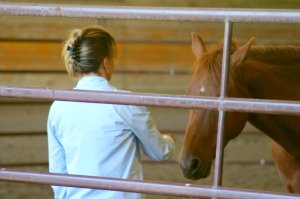
Experience horses. Go to your local county fair or 4H horse shows and head for the horse barns. Notice the scents, the snorts, the soulful or apprehensive look when you make eye contact. Take note of the bugs flying around their dung, the dust in the air of their stalls when sunlight shafts pierce their space.
If safe and only if allowed, touch their bodies appropriately (avoid their flanks and fast movements around their faces). Feel the muscle under their coats -- coats which might be either smooth or rough, depending on the breed and the time of year. Feel the coarseness of their main. If their owners are moving or riding them, hear the thud of their hooves on the ground, and watch the ones at rest, how some of them tip one of their hooves when resting, as compared to the horses that are alert. If you have a bit more time, volunteer at a nearby rescue horse sanctuary or a horse healing facility (either where abused horses are rescued, or disabled or mentally challenged people are given experiences with gentle horses). These places often need volunteers who will take volunteer training and commit for a specified period of time. See if they offer something that fits into your time budget, such as just a couple of weekends. They charge nothing and you may be surprised at the unique details and equine understandings you pick up that you’d never find through reading and video research.
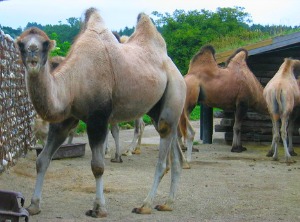
Experience unusual and wild animals. Besides the obvious -- zoos and public aquariums -- the above sample regarding horses can apply to other animals as well: County fairs exhibit lots of livestock from exotic rooster breeds to llamas to New Zealand breeds of sheep. Outside of these fairs check online or the “happenings” section of your local newspaper for nearby dog shows, cat shows, hedgehog shows, reptile shows, demonstrations with raptors. Attend these, and observe particulars others might not notice -- where the beaks and facial feathers connect; the sound some dogs make when they yawn; the variety of sizes of scales on the lizards. An online search may also reveal nearby humane exotic animal sanctuaries that care for camels, elephants, and other animals rescued from low-class scum-bag animal trafficking that help pay for their facility’s costs by allowing visitors to come see, touch, feed and sometimes even ride for a small fee. They may even offer free entrance for trained volunteer services.

Experience making concoctions from real herbs and wild flora. Homemade salves, ointments and kitchen cosmetics are popular now, and how-to workshops show up in many places such as food co-ops and via local groups that advocate self-sufficiency. Sure, your witch’s or galactic alchemist’s mixtures may contain poison oak or purely imagined ingredients that you could never actually experience. But if you attend a three-hour workshop on grinding lemon verbena, mixing shea butter, and blending essential oils -- you can observe and then later describe specifics that could apply to the ingredients used in your story. Specifics such as the feel of semi-solid ingredients as they soften at the stirring of a spoon. The steadiness of hand needed to count and add the drops of the cedarwood essential oil. The sound of the mortar and pestle as fluffy, crunchy dried lavender herbs are pressed into fine powder.
Experience artists and craftspeople. Many towns have an arts or arts and crafts society. See if they offer tours of artist and craftspeople’s studios to observe blacksmiths, glass blowers, fine art painters, potters, some which may allow hands on experience. Notice the sounds of clanging metal hammers, the heat of glass blowing, the scent in the potters’ studio.
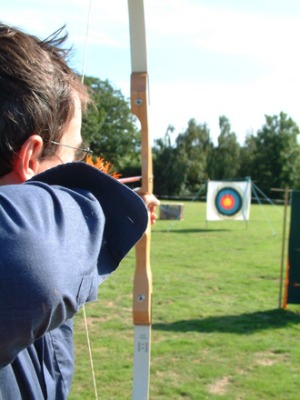
Experience actually making folk crafts or using weapons. Related to several samples above, search for local or nearby short introductory workshops on candle making, rug making, sewing and quilting, polishing silver, mounting fence posts, shooting, archery, and so on. At archery ranges for example, you can have a few experiences without the long-term investment of becoming an expert. It is assumed, of course, that writers will have done excellent in depth research from reading and/or videoes upfront, and will use these middle ground experiences just to add descriptive and occasional factual richness. That means they will know upfront that a workshop on soap making from scratch using lye and lard will come closer to an ancient peasant’s method than a simple modern craft store melt-and-pour soap workshop. The latter uses a technique and materials not available until modern times.
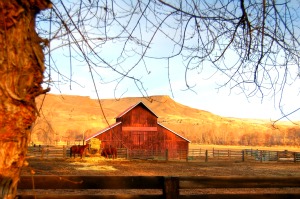
Experience
pre-industrial and old-world farming. Modern, industrialized corporate
agribusiness is a completely different entity than pre-industrial and
old-world peasant farming. Luckily, many people now see the benefits of
pre-industrialized farming and are bringing those old ways back.
Some independent farmers outside the Amish and similar religious communities have purposely refused tractors for farming and use horse power only. Some market gardeners use as little petro-chemical products as possible and cover their tender spring garden plants with reusable old-world glass bell jars instead of plastic.
There are dairies that raise old-European breeds only and some even milk mostly by hand. Some of these farmers give free or low-cost tours and hands-on demonstrations at their farms, or weekend classes on making cheese by hand, milking by hand, and so on.
For writers seeking experiences with flowers and plants associated with fairy folklore and the elementals, there are gardeners who follow the fairy and fae realms spiritually, and sometimes craft tinctures and flower essences for sale. They give tours and demonstrations in their gardens, explaining their connections to these other realms.
Search “garden tours” or “garden
demonstrations” along with your location and any other specifics such as
“fairy” or “hand-milking.” Also search “farmstays,” “farm tours” and
“agritourism” along with your location.
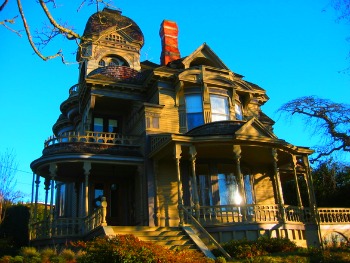
Experience older architecture and furnishings. Are there any historic homes in your town that have been renovated? See if your town sponsors a low-cost one-day home-tour, and if historic homes are on its list. If not your own town, perhaps the neighboring town. Also, look for agritourism events that may open historic barns and farmhouses for tours. Wander through antique stores, and search online for gatherings of historical society architecture tours. Be careful of touching or sitting on items in antique stores, that’s often understandably disallowed. But where possible, notice carvings on wooden chair arms and legs. Sense the velvety feel of upholstered chairs. Listen for wooden floor squeaks in historic homes or buildings. Notice any waviness or air bubbles in glass windows, and how they latch or if they have authentic shutters -- how would one reach out to close those shutters? Take note of the heaviness when lifting the lid of an old trunk. Did you need both hands to lift it easily?
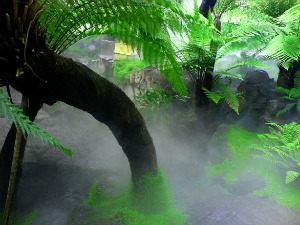
Experience tropical jungles. For temperate zone fantasy writers lucky enough to live near Cornwall, England, the visitor attraction The Eden Project simulates both a tropical rainforest and a Mediterranean environment under two biodomes. But the rest of us can check for closer botanical societies, university botany divisions, zoos and garden clubs for any nearby greenhouse enclosed tropical gardens that allow visitors. Notice the humidity, the warmth as you breathe it in, how those affect your skin and hair, and the colors, textures and scents of the plants growing together.
Successful fantasy and sci-fi writers’ stories aren’t packed solely with detail from beginning to end. Rather, details are sprinkled here and there in just the right places. Fantasy and sci-fi writers can choose details from their middle ground real life research even if they don’t yet have the budget to spend months in exotic locations or pay for extended unique experiences. After your first bestseller, those days may come. Until then, enjoy real life research that might be right around the corner.


